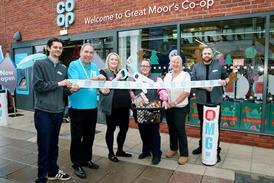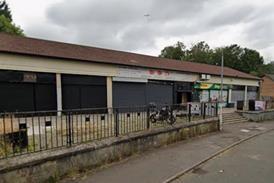Do you do any political lobbying, either personally or by supporting a trade organisation?
Jonathan: I do a massive amount of lobbying as the Association of Convenience Stores' (ACS) vice-chairman, and I also lobby my local MP on local issues, such as planning and crime.
Appean: I contact my local MP all the time.
Lesley: I'm a member of the Federation of Small Businesses (FSB) and also the ACS. I do personal lobbying as well on issues I feel strongly about.
Harry: I do both - it's important to do as much as you can.
Why is it important for retailers to lobby?
Jonathan: Contrary to some retailers' beliefs, you can actually make a difference. You get a policy-maker who has an idea about how to solve a problem, but who doesn't always come up with a realistic solution. By lobbying them, you can let them know what's really happening at the coalface.
Appean: It's vital to get your point of view across.
Lesley: If you don't say something, nothing will get done; or worse still, something could change that could have a negative impact on your business.
Harry: The powers that be need to be made aware of the real facts, rather than manipulated data.
Jeremy: Lobbying is a way of ensuring that decision-makers have all the information that
they need to make informed choices. It's in the interests of retailers to make sure that MPs, for example, are aware of the various issues that affect their business and that there is balance in any debate.
How do you get your point of view across to those making the decisions?
Jonathan: I email, ring or write to district councillors, parish councillors, county councillors and MPs - all the various tiers. The local papers actually ring us now to see what's going on.
Appean: I attend community council meetings and write to my MP. The local press is also well aware of me.
Lesley: I often write to the local paper in response to articles they've written. For example, if they wrote a piece about stores selling alcohol to under-18s, then I'd write to them explaining all the measures we take to avoid this happening to make sure both sides of the story are covered in a balanced way.
Harry: I write to my MP and my local councillor, and I organise community meetings. I've also been to parliament to lobby.
Jeremy: The answers given here illustrate that there are many ways of getting your point across. The best and most effective way, however, is to have face-to-face contact in order to network and build relationships.
Do you talk to politicians only when you want something specific, or is it important to keep an ongoing relationship?
Jonathan: I'm on first name terms with my local MP. It's important to maintain an ongoing relationship.
Appean: I see my MP at least once a month. If I don't visit him, then he comes to see me.
Lesley: I try to keep my MP involved on an ongoing basis with issues such as bank charges, business rates and the tobacco display ban.
Harry: I only really seek out my MP when there's an issue, but he's a customer so he comes in about six times a year anyway.
Do you think retailers are an important resource for politicians to use?
Jonathan: It's a two-way thing - we had a police office installed in-store and got our MP to open it - it was a great photo opportunity for both of us.
Appean: Definitely. We know local people intimately as we see them on a daily basis, and they come to us voluntarily - not just to complain!
Lesley: Yes. I tell my MP: "You're in London - you don't know what goes on in the wider area, whereas I see people every day!"
Harry: Yes - they need us to keep in touch with what's really happening.
Have you considered getting involved in local politics?
Jonathan: Ultimately, I want to be an MP.
Appean: Not really, I'm too busy already ... sometimes it's better to be the number-two man.
Lesley: I've been a councillor for nearly three years. I was first approached because I was already involved in campaigning.
Harry: It's often been suggested, but working full-time as a retailer means I don't have the time.
What is the most successful campaign you've taken part in?
Jonathan: We had a real impact at ACS level when giving evidence for the minimum wage. I gave evidence to an advisory panel and I really felt our voices were heard.
Appean: I had a 25-year lease that I got changed to 125 years. It took 10 years to get there, but that's part of the game. I also started campaigning for green issues - I charge for carrier bags and give the money to the community centre.
Lesley: We had a councillor come to the store so that they could experience the difficulties in judging customers' ages and we got a lot of positive media coverage from that.
Harry: I invited my MP to my store and showed him the possible knock-on effects of the tobacco display ban. He realised that it wasn't feasible and he changed his views from then onwards. I also attended the National Federation of Retail Newsagents' Heart of your Community meeting in parliament, which was very successful.
What advice would you give to retailers who don't want to get involved in lobbying?
Jonathan: You can have a direct impact on future policy - you have to sow the seeds now to reap at a later date. It takes five minutes to write to your MP, so why not just go for it?
Appean: They're silly people. It's too late to complain after the event. You need to act now.
Lesley: You've got to think
long-term if you want to stay involved in the convenience sector.
Harry: At least just send a letter. If you don't act now, you can't complain about it later!
Jeremy: I would encourage all retailers to voice their opinions, whether it's by writing a letter, or engaging on the phone, at the till or in the street.
Jonathan: I do a massive amount of lobbying as the Association of Convenience Stores' (ACS) vice-chairman, and I also lobby my local MP on local issues, such as planning and crime.
Appean: I contact my local MP all the time.
Lesley: I'm a member of the Federation of Small Businesses (FSB) and also the ACS. I do personal lobbying as well on issues I feel strongly about.
Harry: I do both - it's important to do as much as you can.
Why is it important for retailers to lobby?
Jonathan: Contrary to some retailers' beliefs, you can actually make a difference. You get a policy-maker who has an idea about how to solve a problem, but who doesn't always come up with a realistic solution. By lobbying them, you can let them know what's really happening at the coalface.
Appean: It's vital to get your point of view across.
Lesley: If you don't say something, nothing will get done; or worse still, something could change that could have a negative impact on your business.
Harry: The powers that be need to be made aware of the real facts, rather than manipulated data.
Jeremy: Lobbying is a way of ensuring that decision-makers have all the information that
they need to make informed choices. It's in the interests of retailers to make sure that MPs, for example, are aware of the various issues that affect their business and that there is balance in any debate.
How do you get your point of view across to those making the decisions?
Jonathan: I email, ring or write to district councillors, parish councillors, county councillors and MPs - all the various tiers. The local papers actually ring us now to see what's going on.
Appean: I attend community council meetings and write to my MP. The local press is also well aware of me.
Lesley: I often write to the local paper in response to articles they've written. For example, if they wrote a piece about stores selling alcohol to under-18s, then I'd write to them explaining all the measures we take to avoid this happening to make sure both sides of the story are covered in a balanced way.
Harry: I write to my MP and my local councillor, and I organise community meetings. I've also been to parliament to lobby.
Jeremy: The answers given here illustrate that there are many ways of getting your point across. The best and most effective way, however, is to have face-to-face contact in order to network and build relationships.
Do you talk to politicians only when you want something specific, or is it important to keep an ongoing relationship?
Jonathan: I'm on first name terms with my local MP. It's important to maintain an ongoing relationship.
Appean: I see my MP at least once a month. If I don't visit him, then he comes to see me.
Lesley: I try to keep my MP involved on an ongoing basis with issues such as bank charges, business rates and the tobacco display ban.
Harry: I only really seek out my MP when there's an issue, but he's a customer so he comes in about six times a year anyway.
Do you think retailers are an important resource for politicians to use?
Jonathan: It's a two-way thing - we had a police office installed in-store and got our MP to open it - it was a great photo opportunity for both of us.
Appean: Definitely. We know local people intimately as we see them on a daily basis, and they come to us voluntarily - not just to complain!
Lesley: Yes. I tell my MP: "You're in London - you don't know what goes on in the wider area, whereas I see people every day!"
Harry: Yes - they need us to keep in touch with what's really happening.
Have you considered getting involved in local politics?
Jonathan: Ultimately, I want to be an MP.
Appean: Not really, I'm too busy already ... sometimes it's better to be the number-two man.
Lesley: I've been a councillor for nearly three years. I was first approached because I was already involved in campaigning.
Harry: It's often been suggested, but working full-time as a retailer means I don't have the time.
What is the most successful campaign you've taken part in?
Jonathan: We had a real impact at ACS level when giving evidence for the minimum wage. I gave evidence to an advisory panel and I really felt our voices were heard.
Appean: I had a 25-year lease that I got changed to 125 years. It took 10 years to get there, but that's part of the game. I also started campaigning for green issues - I charge for carrier bags and give the money to the community centre.
Lesley: We had a councillor come to the store so that they could experience the difficulties in judging customers' ages and we got a lot of positive media coverage from that.
Harry: I invited my MP to my store and showed him the possible knock-on effects of the tobacco display ban. He realised that it wasn't feasible and he changed his views from then onwards. I also attended the National Federation of Retail Newsagents' Heart of your Community meeting in parliament, which was very successful.
What advice would you give to retailers who don't want to get involved in lobbying?
Jonathan: You can have a direct impact on future policy - you have to sow the seeds now to reap at a later date. It takes five minutes to write to your MP, so why not just go for it?
Appean: They're silly people. It's too late to complain after the event. You need to act now.
Lesley: You've got to think
long-term if you want to stay involved in the convenience sector.
Harry: At least just send a letter. If you don't act now, you can't complain about it later!
Jeremy: I would encourage all retailers to voice their opinions, whether it's by writing a letter, or engaging on the phone, at the till or in the street.
What are you campaigning about at the moment?
Jonathan: Planning policy is a big issue as I want the Town Centre First policy to be protected. I have also contacted my MP about the tobacco display ban and he's against it going ahead.
Appean: At the moment I'm trying to get my post office back as it's currently been suspended. It's a very harsh decision, which I'm appealing against - the locals are all signing a petition for me. I've also sent my MP a letter about the tobacco display ban, but not received a reply yet. We can't rely on cigarette sales for ever - but we're not ready for a display ban yet.
Lesley: Bank charges have shot up ridiculously, so that's a key focus for me.
Harry: I'm still campaigning against the tobacco display ban, and also for the post offices to have banks.
Jeremy: Retailers are clearly getting involved in the debate about a potential tobacco display ban and expressing their concerns at the prospective loss of business if the display ban comes into force. We would encourage all retailers to speak to their local MP about this issue and explain their concerns to them. If you do not know who your local MP is then please visit: www.writetothem.com, or phone the Tobacco Retailers Alliance (TRA) on 0800 00 82 82 for assistance.
Jonathan: Planning policy is a big issue as I want the Town Centre First policy to be protected. I have also contacted my MP about the tobacco display ban and he's against it going ahead.
Appean: At the moment I'm trying to get my post office back as it's currently been suspended. It's a very harsh decision, which I'm appealing against - the locals are all signing a petition for me. I've also sent my MP a letter about the tobacco display ban, but not received a reply yet. We can't rely on cigarette sales for ever - but we're not ready for a display ban yet.
Lesley: Bank charges have shot up ridiculously, so that's a key focus for me.
Harry: I'm still campaigning against the tobacco display ban, and also for the post offices to have banks.
Jeremy: Retailers are clearly getting involved in the debate about a potential tobacco display ban and expressing their concerns at the prospective loss of business if the display ban comes into force. We would encourage all retailers to speak to their local MP about this issue and explain their concerns to them. If you do not know who your local MP is then please visit: www.writetothem.com, or phone the Tobacco Retailers Alliance (TRA) on 0800 00 82 82 for assistance.
How else could the ACS and other trade associations help c-store retailers to lobby?
Jonathan: I may be a bit biased, but I think the ACS is doing a great job.
Appean: The ACS is doing some brilliant work. James Lowman is excellent - he's always at the forefront of campaigns.
Lesley: The ACS holds good seminars, but I'm frustrated that they are always too far away for me to attend. In the FSB we have a local branch and we attend events there and meet people we wouldn't normally have access to.
Harry: The ACS has excellent communication channels with many retailers, so they could do more research surveying retailers' views and passing this on to MPs.
Jeremy: Trade associations have the ability to speak for a collection of retailers. My advice is to use the support of trade associations as much as possible. However, retailers should also create opportunities to put their individual and local points across on a one-to-one basis when and where they can.
Jonathan: I may be a bit biased, but I think the ACS is doing a great job.
Appean: The ACS is doing some brilliant work. James Lowman is excellent - he's always at the forefront of campaigns.
Lesley: The ACS holds good seminars, but I'm frustrated that they are always too far away for me to attend. In the FSB we have a local branch and we attend events there and meet people we wouldn't normally have access to.
Harry: The ACS has excellent communication channels with many retailers, so they could do more research surveying retailers' views and passing this on to MPs.
Jeremy: Trade associations have the ability to speak for a collection of retailers. My advice is to use the support of trade associations as much as possible. However, retailers should also create opportunities to put their individual and local points across on a one-to-one basis when and where they can.






























No comments yet